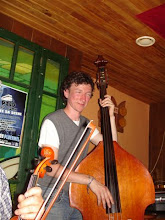out of this morning horizon
not a whisper,
as he pedals on - empty
but for his dog's whimper.
round shapes are woven
in a road of no signs,
straight memories
and a curvy heart.
blue men are surfacing already
but he has lost awareness,
no pity or charm feature
in the atmosphere of this peaceful karaoke.
blue men surfaced as he leveled the station
and the rainbow was silk as he deposited those kind
creatures of paradise floating through the plaster
walls bearing the marks of mistakes and a master misery.
blue men traveled with the man
and at length,
they expected no further
dance, they lingered in tumorous waves.
blue men were there and still waiting
for a passing verse, a passing shadow,
a mighty glowworm for the great flat lands
in a night that was his own hunt for a dry patch.
blue men scattered. They waited among the chimneys
They lurked among the barbed wires, blue men.
blue men and a big man were one great spot
on a blank canvas.
On that day, all things laid bare
They had been left to dry in the back yard
Naked shapes and straight roads
Had carved the way for an unmissable arrival
Both a man and those blue men he never knew
A great spot on a blank canvas
Stepped on the moonlight that day
Until the pedaling died off
back up the lane
until some peace
and
hajnal




